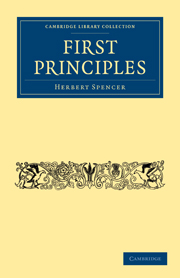Book contents
- Frontmatter
- PREFACE
- Contents
- PART I THE UNKNOWABLE
- PART II LAWS OF THE KNOWABLE
- I LAWS IN GENERAL
- II THE LAW OF EVOLUTION
- III THE LAW OF EVOLUTION (CONTINUED)
- IV THE CAUSES OF EVOLUTION
- V SPACE, TIME, MATTER, MOTION, AND FORCE
- VI THE INDESTRUCTIBILITY OF MATTER
- VII THE CONTINUITY OF MOTION
- VIII THE PERSISTENCE OF FORCE
- IX THE CORRELATION AND EQUIVALENCE OF FORCES
- X THE DIRECTION OF MOTION
- XI THE RHYTHM OF MOTION
- XII THE CONDITIONS ESSENTIAL TO EVOLUTION
- XIII THE INSTABILITY OF THE HOMOGENEOUS
- XIV THE MULTIPLICATION OF EFFECTS
- XV DIFFERENTIATION AND INTEGRATION
- XVI EQUILIBRATION
X - THE DIRECTION OF MOTION
Published online by Cambridge University Press: 29 August 2010
- Frontmatter
- PREFACE
- Contents
- PART I THE UNKNOWABLE
- PART II LAWS OF THE KNOWABLE
- I LAWS IN GENERAL
- II THE LAW OF EVOLUTION
- III THE LAW OF EVOLUTION (CONTINUED)
- IV THE CAUSES OF EVOLUTION
- V SPACE, TIME, MATTER, MOTION, AND FORCE
- VI THE INDESTRUCTIBILITY OF MATTER
- VII THE CONTINUITY OF MOTION
- VIII THE PERSISTENCE OF FORCE
- IX THE CORRELATION AND EQUIVALENCE OF FORCES
- X THE DIRECTION OF MOTION
- XI THE RHYTHM OF MOTION
- XII THE CONDITIONS ESSENTIAL TO EVOLUTION
- XIII THE INSTABILITY OF THE HOMOGENEOUS
- XIV THE MULTIPLICATION OF EFFECTS
- XV DIFFERENTIATION AND INTEGRATION
- XVI EQUILIBRATION
Summary
§ 85. The Absolute Cause of changes, inclusive of those constituting Evolution, is not less incomprehensible in respect of the unity or duality of its action, than in all other respects. We cannot decide between the alternative suppositions, that phenomena are due to the variously-conditioned workings of a single force, and that they are due to the conflict of two forces. Whether, as some contend, everything is explicable on the hypothesis of universal pressure, whence what we call tension results differentially from inequalities of pressure in opposite directions; or whether, as might be with equal propriety contended, things are to be explained on the hypothesis of universal tension, from which pressure is a differential result; or whether, as most physicists hold, pressure and tension everywhere co-exist; are questions which it is impossible to settle. Each of these three suppositions makes the facts comprehensible, only by postulating an inconceivability. To assume a universal pressure, confessedly requires us to assume an infinite plenum—an unlimited space full of something which is everywhere pressed by something beyond; and this assumption cannot be mentally realized. That universal tension is the immediate agency to which phenomena are due, is an idea open to a parallel and equally fatal objection. And however verbally intelligible may. be the proposition that pressure and tension everywhere co-exist, yet we cannot truly represent to ourselves one ultimate unit of matter as drawing another while resisting it.
- Type
- Chapter
- Information
- First Principles , pp. 286 - 312Publisher: Cambridge University PressPrint publication year: 2009First published in: 1862



